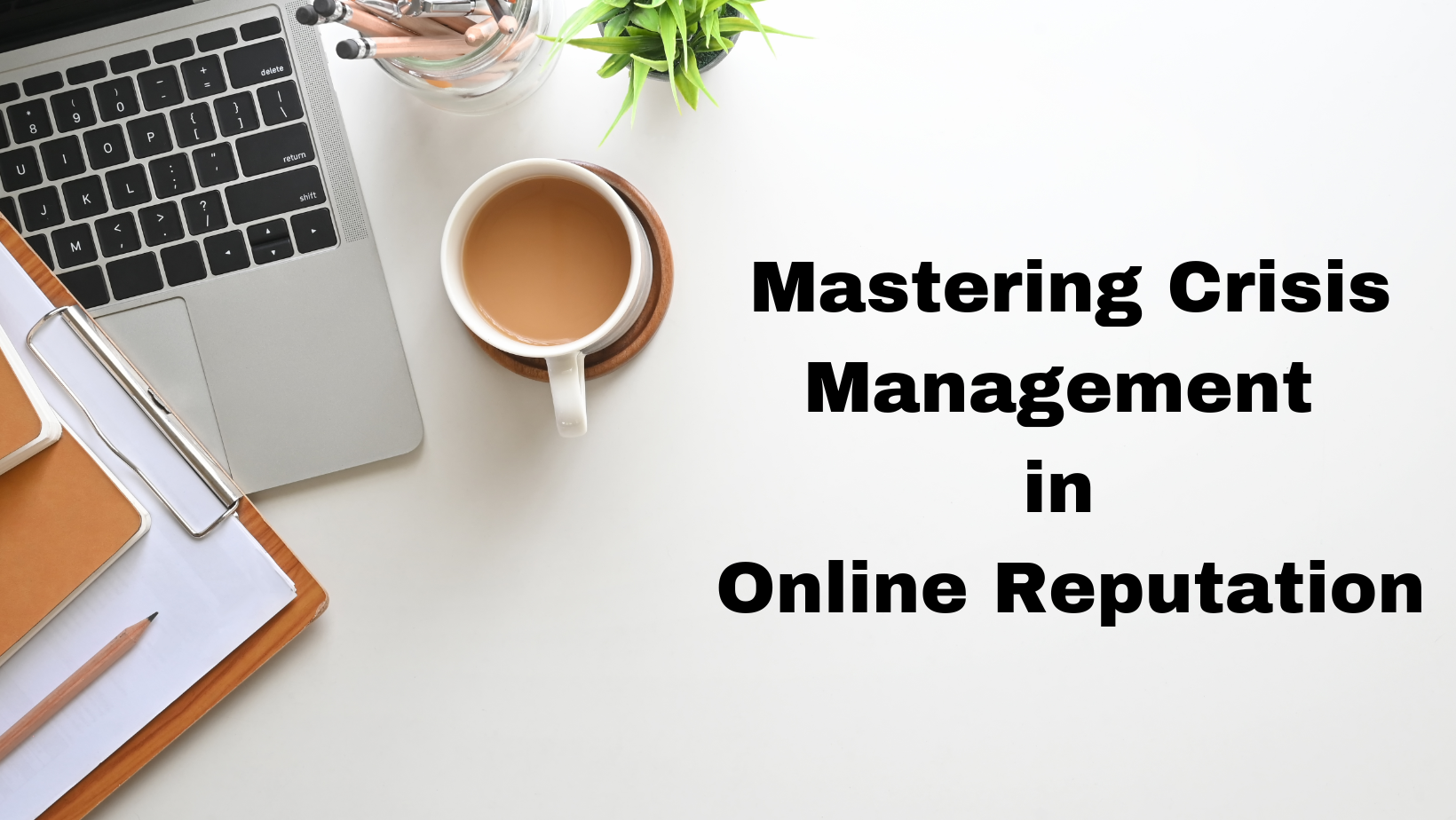Reputation is everything. A single negative review or scandalous rumor has the power to tarnish even the most established brands and individuals. It's no wonder that online reputation management has become a crucial aspect of any successful business or personal brand. But what happens when a crisis strikes? How does one navigate the treacherous waters of reputation repair? This is where mastering crisis management in online reputation comes into play. Picture this: your business, once a shining star in your industry, suddenly finds itself at the center of a social media storm.
Negative comments, damaging articles, and viral videos flood the internet, threatening to bring your reputation crashing down. Panic sets in, and you're left wondering how to salvage what remains of your online presence. This is when you need to take a step back, take a deep breath, and embrace the art of rebuilding trust. In this blog post, we will take an in-depth look at the strategies and techniques that can help you master crisis management in the realm of online reputation.
We'll explore real-life examples of companies and individuals who have faced severe reputation challenges and successfully bounced back stronger than ever. From crafting a comprehensive crisis communication plan to implementing proactive measures to safeguard your online reputation, we will leave no stone unturned. Whether you're a business owner, a marketing professional, or simply an individual concerned about protecting your personal brand, this blog post is a must-read. Join us on this journey as we delve into the world of rebuilding trust and mastering crisis management in the realm of online reputation.
Get ready to equip yourself with the knowledge and tools necessary to weather any storm that comes your way, and emerge with an even stronger and more resilient online presence.
Understanding the Importance of Online Reputation Management
Information spreads at lightning speed and opinions can be shared with a global audience in an instant, online reputation management has become a critical aspect of any business or personal brand. Your online reputation is essentially how you are perceived by others when they search for you or your brand on the internet. It encompasses everything from customer reviews and social media mentions to news articles and blog posts.
Why is online reputation management so important? Well, consider this: studies have shown that the majority of consumers trust online reviews as much as personal recommendations. In fact, a single negative review can drive away potential customers and harm your bottom line. On the other hand, a positive online reputation can attract new customers, build trust, and ultimately contribute to your success.
But it's not just about attracting customers. Your online reputation also plays a crucial role in attracting investors, partners, and even potential employees. People want to do business with companies they trust and admire. They want to work for individuals who have a solid track record and a positive online presence.
So how do you go about managing your online reputation? It starts with understanding the importance of monitoring what is being said about you or your brand on the internet. This means regularly checking search engine results, social media platforms, review sites, and industry-specific forums.
Identifying and Analyzing the Crisis Situation
No matter how proactive you are in managing your online reputation, there may come a time when a crisis strikes. It could be an unhappy customer who takes their grievances public or a viral video that paints your brand in a negative light. Whatever the case may be, it's essential to identify and analyze the crisis situation before taking any action.
The first step is to gather all the relevant information. This includes collecting screenshots, links, and any other evidence related to the crisis. It's important to have a clear understanding of what has happened and how it is impacting your online reputation.
Next, you need to assess the severity of the crisis. Is it a minor issue that can be resolved quickly, or is it a major incident that requires a more comprehensive response? This will help you determine the appropriate course of action and allocate resources accordingly.
Once you have identified and analyzed the crisis situation, it's time to move on to crafting a comprehensive crisis communication plan.
Crafting a Comprehensive Crisis Communication Plan
A crisis communication plan is essential for effectively managing your online reputation during times of crisis. It provides a roadmap for how you will communicate with your stakeholders, including customers, employees, investors, and the media.
The first step in crafting a comprehensive crisis communication plan is to define your objectives. What do you hope to achieve through your communication efforts? Is it to apologize and make amends? Is it to provide accurate information and address any misconceptions? Or is it simply to reassure your stakeholders that you are taking the necessary steps to resolve the issue?
Once you have defined your objectives, you can start developing key messages that align with those objectives. These messages should be clear, concise, and consistent across all communication channels.
In addition to key messages, your crisis communication plan should also include guidelines for responding to different types of crises. For example, if the crisis involves negative customer reviews on social media, your plan should outline how you will address those reviews in a timely and professional manner.
Establishing Transparency and Authenticity in Your Response
When faced with a reputation crisis, one of the most important things you can do is establish transparency and authenticity in your response. People appreciate honesty and are more likely to forgive and forget if they feel that you are being genuine.
Transparency means being open and honest about what has happened, why it happened, and what you are doing to address the issue. It means acknowledging any mistakes or shortcomings on your part and taking responsibility for them.
Authenticity, on the other hand, means being true to your brand values and voice. It means communicating in a way that is consistent with how you would normally communicate with your stakeholders.
Establishing transparency and authenticity can be achieved through various communication channels, including social media posts, press releases, blog posts, and direct communication with affected individuals or groups.
Monitoring and Responding to Online Conversations
During a reputation crisis, it's crucial to monitor online conversations closely. This includes keeping an eye on social media platforms, review sites, forums, and any other online spaces where people may be discussing your brand.
Monitoring online conversations allows you to stay informed about what is being said about you or your brand in real-time. It also gives you the opportunity to respond promptly to any negative comments or misinformation that may arise.
When responding to online conversations during a crisis, it's important to remain calm and professional. Avoid getting into arguments or engaging in heated debates. Instead, focus on providing accurate information, addressing concerns, and demonstrating your commitment to resolving the issue at hand.
Leveraging Social Media to Rebuild Trust
Social media can be a powerful tool for rebuilding trust during a reputation crisis. It allows you to directly engage with your audience and demonstrate your commitment to addressing their concerns.
One effective strategy is to use social media platforms as a channel for regular updates and progress reports. This shows that you are actively working to resolve the issue and keeps your stakeholders informed every step of the way.
In addition to regular updates, social media can also be used to showcase positive stories and testimonials from satisfied customers. This helps counterbalance any negative sentiment and rebuild trust in your brand.
Engaging with Influencers and Brand Advocates
During a reputation crisis, it's important to leverage the power of influencers and brand advocates. These are individuals or organizations who have a significant following or influence within your industry or target audience.
Engaging with influencers and brand advocates can help amplify your message, reach a wider audience, and build credibility. They can share positive stories about your brand, provide testimonials, or even act as spokespersons during times of crisis.
When engaging with influencers and brand advocates, it's important to choose individuals or organizations that align with your values and have a genuine interest in supporting your brand. Building authentic relationships is key to successful collaboration.
Implementing Proactive Measures to Safeguard Your Online Reputation
While it's crucial to have a plan in place for managing reputation crises when they occur, it's equally important to implement proactive measures to safeguard your online reputation on an ongoing basis.
This includes regularly monitoring search engine results for any negative content that may appear, actively managing customer reviews on various platforms, maintaining an active presence on social media, and consistently delivering high-quality products or services.
In addition, it's important to stay up-to-date with the latest trends and best practices in online reputation management. The digital landscape is constantly evolving, so it's essential to adapt your strategies accordingly.
Learning from Real-Life Examples: Successful Reputation Repair Strategies
One of the best ways to learn about successful reputation repair strategies is by studying real-life examples. There have been numerous cases where companies and individuals have faced severe reputation challenges and managed to bounce back stronger than ever.
For example, consider the case of a well-known restaurant chain that was hit with a food poisoning scandal. Instead of hiding from the issue, they took immediate action, closed down affected locations, conducted thorough investigations, and implemented new safety protocols. They also communicated transparently with their customers throughout the process, demonstrating their commitment to resolving the issue and ensuring it would not happen again.
Another example is that of a popular social media influencer who faced backlash after making an offensive comment. Instead of ignoring or downplaying the issue, they issued a heartfelt apology, engaged in open dialogue with their followers, and committed to educating themselves on the topic at hand. This demonstrated their willingness to learn from their mistakes and grow as an individual.
By studying these real-life examples and understanding the strategies that led to successful reputation repair, you can gain valuable insights into how to navigate your own reputation challenges.
Conclusion: Emerging Stronger and More Resilient in the Digital Landscape
In conclusion, mastering crisis management in online reputation is essential for any business or personal brand operating in today's digital landscape. A reputation crisis can strike at any time, but by understanding the importance of online reputation management, identifying and analyzing crisis situations, crafting comprehensive crisis communication plans, establishing transparency and authenticity in your response, monitoring and responding to online conversations, leveraging social media to rebuild trust, engaging with influencers and brand advocates, implementing proactive measures to safeguard your online reputation, learning from real-life examples of successful reputation repair strategies – you can emerge stronger and more resilient than ever before.
Remember that rebuilding trust takes time and effort. It requires consistent communication with your stakeholders, a commitment to transparency and authenticity, and a willingness to learn from your mistakes. By following the strategies outlined in this blog post, you can navigate the challenges of reputation management with confidence and emerge with an even stronger online presence.
The AI Web Agency is dedicated to helping our clients grow their business. Growth is the DNA and foundation of our focus in everything we provide to our clients. The AI Web Agency offers marketing services that make our client's phones ring, their websites fill with visitors, and keeps their existing clients engaged. We deliver this growth both online and offline, to local businesses and national brands. We leverage the power of AI to provide precision personalized content delivered via Email, Web, and Social Media to help businesses grow.









